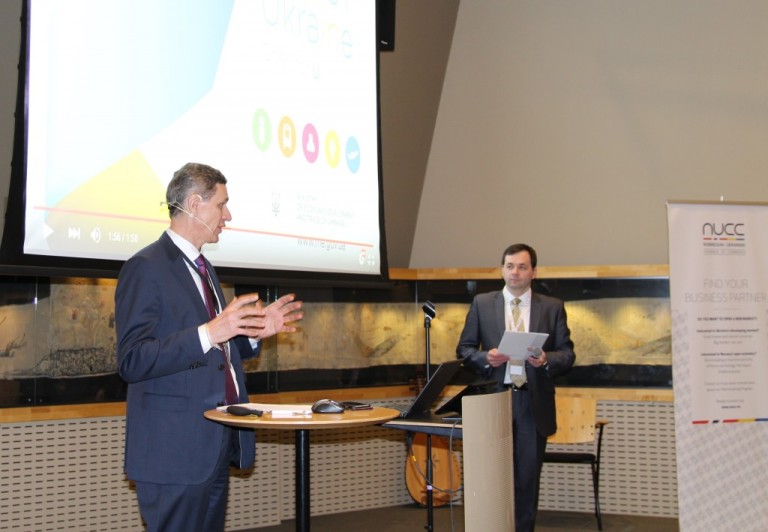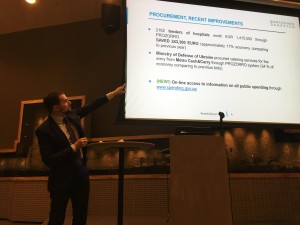
Private sector plays a vital role in unlocking Ukrainian’s potential
The Ukrainian government has already taken several steps to improve the business climate, but needs to keep up its reform work. A strong and vibrant private sector is vital for a prosperous Ukraine.
This was the message from speakers at the Norwegian-Ukrainian Chamber of Commerce’s (NUCC) Networking meeting 8th March. Amongst them were Tore Hattrem, Deputy Minister at the Norwegian Ministry of Foreign Affairs, Oleh Hrabovetskyi, Chargé d’Affaires a.i. of Ukraine in the Kingdom of Norway, and Borys Danevych, partner at Marchenko Danevych Law Firm, a member of NUCC.
There is a lot happening in Ukraine these days. The country is in the midst of a comprehensive reform process and the political situation is somewhat volatile. The Ukrainian government recently survived a no-confidence vote. What will happen the next months is still far from certain.
This raises many questions: What is the political situation? What are the effects of the reform process? Have they improved the business climate? And what are the effects on trade and business opportunities? The speakers at the meeting provided us with some answers to these questions. Around 50 representatives, mostly from the Norwegian and Ukrainian business community, but also other interested parties, participated in the discussion and shared their experiences.
The political situation and the reform process
On his recent trip to Kyiv, Tore Hattrem met with several policy makers. His impression is that there is a clear will to enact new reforms, but that implementation is a challenge. Given the recent political turmoil Hattrem said that it is too early to draw any firm conclusion.
Despite the loss of coalition support, Oleh Hrabovetskyi assured us that the President, the Government and the Parliament in Ukraine, will do their utmost to save the unity of all political forces. Hrabovetskyi said that the Ukrainian government has undertaken a number of deep reforms in state governance, procurement, budget formation, education, and in the agriculture and energy sector aimed at decentralization, transparency and curbing corruption.
Hattrem pointed out that Ukraine is going through a historical transitional phase. He said that such a transition would clearly not be easy, but with persistent effort from politicians and civil society in Ukraine, supported by international partners, the road ahead is far from impossible. A prerequisite for a prosperous Ukraine is strong and vibrant private sector, according to Hattrem.
«A strong and vibrant private sector is a prerequisite for a prosperous Ukraine»
Improvement in the business climate
The private sector plays an important role in creating economic growth and job opportunities. Ukraine has launched an ambitious reform program. One key question is what this means for the business climate and investment opportunities?
Borys Danevych, a Ukrainian lawyer with extensive experience in advising companies entering the Ukrainian market, provided some answers to this question in his presentation. Despite substantial barriers remaining, Danevych said that the government has taken some steps to improve governance and business climate. Like Hattrem, he sees implementation as a major challenge.
The introduction of open public procurement is, according to Danevych, one of the most important reforms undertaken by the government. The new procurement law requires open public tenders for all purchases above a certain threshold and a new electronic system to handle tenders has been implemented.
The Ukrainian government has taken several steps to improve E-governance. It is about to or has already introduced several electronic services, such as on-line access to property and companies’ databases, electronic form of title documents, registers of notaries, trustees in bankruptcy etc. This can, according to Danevych, have significant impact on reducing corruption, improving transparency and decreasing transaction costs. Although corruption is still widespread, Ukraine climbed a few steps up the Transparency International’s corruption index from 142nd out of 175 countries in 2014 to 130 out of 168 in 2015.
The Parliament recently adopted a tax reform, where key tax rates were reduced, and many procedures become more transparent and predictable (including the VAT refund procedure). The finance ministry has ambitions to implement further measures to improve financial transparency and reform the tax authority. Deregulation in accounting and documentation of services has improved the business climate in the ICT sector.
Growing interest for trade between Norway and Ukraine
Both Hattrem and Hrabovetskyi see opportunities and a growing interest in the trade relations between Norway and Ukraine. Hattrem uses the high turnout from both the Norwegian and Ukrainian business community at NUCC´s Norwegian-Ukrainian ICT & Investment Conference in November 2015 to illustrate his point. According to him, the conference is a symbol of the potential of Norwegian Ukrainian trade. However, the two governments must work together in order to unleash this potential.
In 2014, Ukraine and the EU signed an association agreement. The purpose is to bring the two markets closer together. According to Hrabovetskyi, the Deep and Comprehensive Free Trade Area, a free trade agreement, which went into force this year, will provide Ukrainian exporters with better access to the European market. Hrabovetskyi also highlighted the importance of visa-free travel for Ukrainian citizens to Europe (Schengen area). The European Commission has backed the visa liberalization and is expected to come with a concrete proposal in April. Enhanced economic integration between Ukraine and the EU could also benefit Norwegian companies doing business in Ukraine.
Ukraine is a market with great opportunities. The private sector plays a vital role to unlock these. As Hattrem said: “If the private sector can succeed, Ukraine can succeed”. After years in recession, the economic prospects looks brighter and the economy might start to rebound according to IMFs forecasts. In NUCCs view, this is a good time for companies to look at Ukraine for opportunities.
After these interesting and informative presentations about the political and economic situation Ukraine it was time to feed the soul. The meeting ended with beautiful Ukrainian folk music. Svyatoslav Sylenko, a young talented folk singer well known in Ukraine, played bandura and sang some melodious songs.
NUCC wants to thank Telenor for hosting the meeting and Evry for providing snacks and drinks. Our next meeting will be in Kyiv in June. The next networking meeting in Norway, will take place in Oslo in September. Watch this space for the exact dates and agenda.






